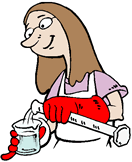
![]()
Solutions

Let's Look at Chemistry: One Special Mixture: Solutions
Visit the sites listed below. (Just click on the links below so you won’t have to key in the URLs.)
Solids and Liquids
http://www.sciencebob.com/experiments/polymer.html
A recipe for Homemade Slime (a polymer) that has the properties of a solid and a liquid.
Why Does Ice Float?
http://www.units.muohio.edu/dragonfly/snow/icefloat.htmlx
A clear, concise description of why water becomes less dense and floats in its solid phase. Lots of other great information on this site as well.
Mass vs Weight
http://www.exploratorium.edu/ronh/weight/
The calculator in “Your Weight on Other Worlds” may help your students understand the distinction between mass and weight. If a student’s body has a mass of 100 pounds (~45 kilograms) on Earth, that student’s body mass remains the same on any other planet. That is, it contains the same amount of matter, no matter where it is. However, because the gravitational forces of other planets differ from Earth’s, a student who weighs 100 pounds (~45 kilograms) on Earth will weigh 37.7 pounds (~16.9 kilograms) on Mars, only 16.6 pounds (~7.4 kilograms) on the Moon, and a whopping 253.3 pounds (~113.9 kilograms) on Jupiter!
Mass, Volume, and Density
http://www.sciencenet.org.uk/articlesfeatures/tech/eureka.html
Eureka! The Story of Archimedes. The story of Archimedes’ famous “Crime Scene Investigation,” in which he used volume, mass, and density to determine that the king was a victim of fraud.
 |
 |
